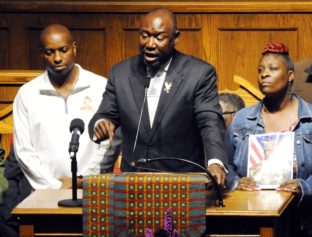Rev. Jesse Jackson was able to win the releaseof two Gambian-Americans serving long prison sentences in Gambia by using his personal relationship with Gambian president Yahya Jammeh and persuading him to let the men go.
The release was especially timely because Jammeh has already executed nine prisoners on his country’s death row and had announced that he may execute dozens more—though he recently announced a moratorium on the executions.
The two men, Amadou Scattred Janneh and Tamsir Jasseh, had been high-ranking officials in Jammeh’s government who were imprisoned on the routine charge of treason, which Jammeh often leveled against those who fall out of favor with his government. They were held in the country’s notorious Mile 2 Central Prison, though neither one was on death row.
Jammeh has been a frequent target of denunciation by human rights groups because of the oppressive measures he uses in Gambia, including systematic torture, jailing of journalists, repression of free speech and rigging of elections.
In a recentreport on Gambia, Freedom House accused the president of “voter intimidation and government control of the media,” saying “journalists are subject to arrests, harassment and violence.” It noted the “torture of prisoners, including political prisoners,” as well as “severe suppression of the opposition, media and civil society.”
In a telephone interview, Jasseh, who had been head of Gambia’s immigration agency, told the Times that his six and a half years in prison was a “very horrible experience, inhumane,” saying he had been “tortured horribly.” Janneh, a former information minister, said Mile 2 was “one of the worst prisons in the world.”
According to Janneh once taught at the University of Tennessee, and Mr. Jasseh is a veteran of the United States military.
Mr. Jackson said his personal connection to the Gambian president provided an opening in persuading the leader, a former army colonel and wrestler who seized power in 1994, to release the two men. “I’ve known him and met him on several occasions,” Mr. Jackson said.
Human rights groups routinely denounce Mr. Jammeh’s government for its systematic use of torture, jailing of journalists, repression of free speech and rigging of elections.
Freedom House, in its latest report on Gambia, cited “voter intimidation and government control of the media,” saying “journalists are subject to arrests, harassment and violence.” It noted the “torture of prisoners, including political prisoners,” as well as “severe suppression of the opposition, media and civil society.”
Jammeh recently shut down two leading independent newspapers and arrested two journalists for trying to secure a permit to protest the executions. Earlier in the month, the government expelled a visiting BBC West Africa correspondent who had come to report on the executions.
“These executions were a distraction from growth,” Rev. Jackson told the Times, noting what he said was the country’s high economic growth rate.
“They’ve got some good things happening there,” Jackson said. “There are some arrows pointing upwards.”
Jackson has frequently intervened in foreign nations over the years to win the release of Americans who have been wrongly imprisoned by foreign governments.


